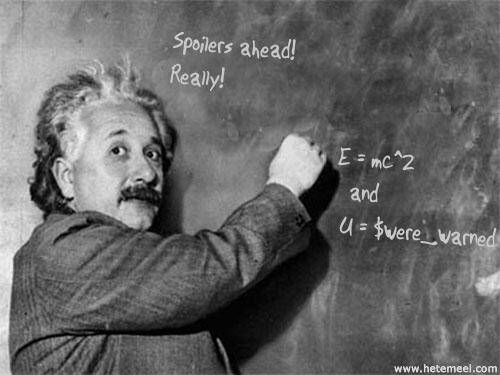There’s been a lot of good depictions of time travel in media lately. The History of Time Travel is exactly what you would expect to see on a knock-off Discovery Channel program. Bodies on Netflix is simply phenomenal. The Marvel TV show Loki has treated the subject well, and I’m definitely one of those people who will keep saying Edge of Tomorrow is phenomenally under-rated.
But I’ve got a spoiler for pretty much all of them. Because every time-travel story with a self-referential "loop" has a built-in problem.
Seriously.


Many depictions of time travel involve a loop of some kind. The one in Groundhog Day works just fine, but it becomes particularly acute in media where the loop is self-referential, like in Bodies or the Ethan Hawke film Predestination.
Time isn’t Jeremy Bearimy in these films — it’s largely linear. Even Loki with its multiverses still largely has "time" existing as a linear concept. Like this:

The plot in all of these involves a change to the original timeline. An intervention. Whether it is the delivery of a manual or the impregnation of your great-great-grandmother, an outside force creates a loop that is dependent upon the loop’s creation, like so:

That loop then … well, loops. An infinite number of times. {1}
Except that it will always collapse and fail.
Always.
These loops require a specific series of events to happen within a certain tolerance for the loop to be able to repeat. That pressure backwards from the future to create the loop is an intervention. It adds something, making the loop a higher-energy version of what was there "before."
That, however, makes it unstable. If the energy of that intervention changes sufficiently, then the loop does not continue.
For example, in Bodies, simply changing one character’s perspective on events is enough to start a chain of changes. Ink on a crucial equation in the manual smears. And so on.
Given an infinite number of iterations, there will be a pass through the loop where conditions are such that the loop cannot continue. It may take forever — Bill Murray’s character spent 12,395 days in Groundhog Day — but the likelihood of anything happening, no matter how outrageous (such as the creation of a whale several miles above the surface of an alien planet), is an absolute certainty.
"Eventually" — whatever that actually means in this context — the manual will not be delivered, the ancestor will not be seduced, and the loop collapses. Arguably, such could be happening constantly and those uninvolved would be utterly unaware of it, as the loops would (from a viewpoint outside of time) collapse almost "instantly" (again, whatever that means here).
Many of these plots also stop to monologue about the existence — or lack — of free will. What I’ve pointed out here, however, does not require free will for it to be correct.
There is — as best I can understand it, I’m not a physicist — a fundamental, low-level randomness to the universe in quantum fluctuations. This is an effect that, in normal circumstances, has absolutely no effect upon us at the macroscopic scale.
A time loop is not normal circumstances.
If your decisions are not made by "free will," they instead depend "on the millions of factors and forces that have already happened to you that you’re blissfully unaware of." (Bodies is seriously well-written.)
However, those "millions of factors and forces" do include all that low-level randomness. The low-level substrate of the universe — it’s "seed number," if you will — is not going to be identical through each iteration of the loop.
The odds of there being a sufficiently large difference at the quantum level that it has an appreciable effect on the macroscopic level, sufficient to disrupt the time loop, are absolutely astronomical.
Which doesn’t matter at all when you’re talking about infinity.
Ultimately, these stories will all resolve the same way — whether or not there’s dramatic tension, whether or not it’s fatalistic or idealistic, what philosophical thrust it has — is entirely dependent upon our point of view in the story.
Which, I guess, can also technically be said about any story.
That said, I still recommend all the films and shows I’ve mentioned in this post. All of them are quite smart, will often make you think, and are a lot of fun. Check them out!
{1} This statement alone is philosophically mind-boggling if you think about it too hard. How does it "loop"? Does that mean from a point of view? Or does that mean from all points of view? Are all of us literally experiencing the same part of time at all?
Featyred Image by Gerd Altmann from Pixabay
